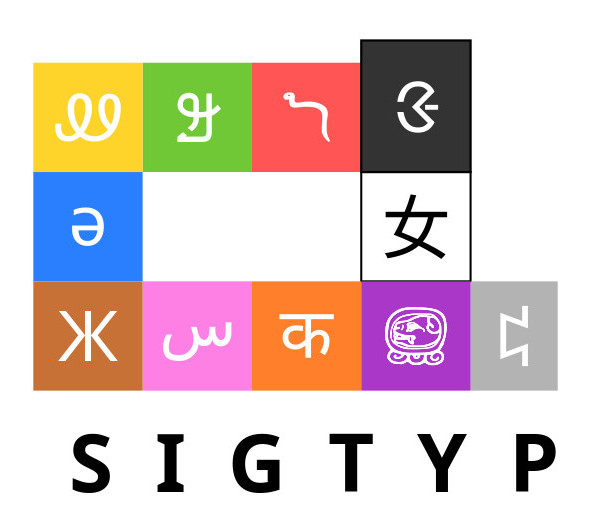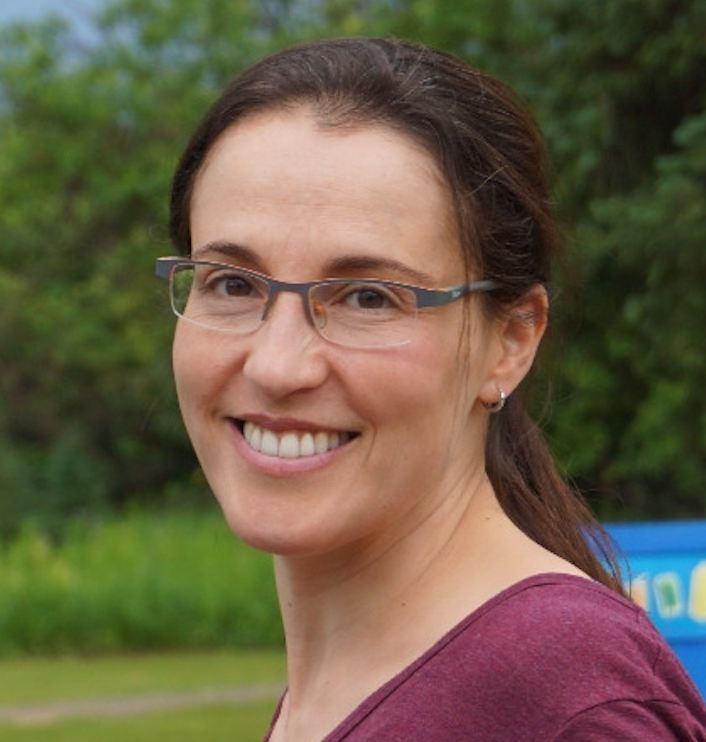May, 6th 2023 • Dubrovnik, Croatia
Co-located with EACL2023
SIGTYP2023 Proceedings are now available here
Join our RocketChat channel
Important Dates
January 9, 2023: First Call for Workshop Papers
January 30, 2023 Second Call for Workshop Papers
February 13, 2023 February 22, 2023: Paper submission deadline
March 13, 2023 March 23, 2023: Notification of acceptance
April 4, 2023: Camera-ready deadline
May 6, 2023: Workshop
Keynote Speakers
Workshop Description
Encouraged by the 2019 -- 2022 workshops, the aim of the fifth edition of SIGTYP workshop is to act as a platform and a forum for the exchange of information between typology-related research, multilingual NLP, and other research areas that can lead to the development of truly multilingual NLP methods. The workshop is specifically aimed at raising awareness of linguistic typology and its potential in supporting and widening the global reach of multilingual NLP, as well as at introducing computational approaches to linguistic typology. It will foster research and discussion on open problems, not only within the active community working on cross- and multilingual NLP but also inviting input from leading researchers in linguistic typology. Starting from 2021, the workshop is dedicated to a shared theme, a central topic that most keynote talks and discussions are focused on. For instance, in 2021 we followed up a recent debate on linguistic diversity (p-linguistics, the study of individual languages) and universalism (g-linguistics, the study of Human Language), see Haspelmath (2020); Evans and Levinson (2009). The process of annotation of highly cross-lingual corpora (such as recently introduced Universal Dependencies (Nivre et al., 2016) and UniMorph (Sylak-Glassman, 2016)) requires distinguishing language-specific, historically accidental phenomena from truly universal phenomena such as the fact that all languages have demonstratives (Diessel, 2014). Our workshop will serve as a platform to enable fruitful discussions.
In 2023, we would like to continue following this direction of research with a special focus on bringing technology to foster documentation of under-described languages.
Main Topics
The workshop will provide focussed discussion on a range of topics, including (but not limited to) the following:
• Integration of typological features in language transfer and joint multilingual learning. In addition to established techniques such as “selective sharing”, are there alternative ways to encoding heterogeneous external knowledge in machine learning algorithms?
• Development of unified taxonomy and resources. uilding universal databases and models to facilitate understanding and processing of diverse languages.
• Automatic inference of typological features. The pros and cons of existing techniques (e.g. heuristics derived from morphosyntactic annotation, propagation from features of other languages, supervised Bayesian and neural models) and discussion on emerging ones.
• Typology and interpretability. The use of typological knowledge for interpretation of hidden representations of multilingual neural models, multilingual data generation and selection, and typological annotation of texts.
• Improvement and completion of typological databases. Combining linguistic knowledge and automatic data-driven methods towards the joint goal of improving the knowledge on cross-linguistic variation and universals.
• Linguistic diversity and universals. Challenges of cross-lingual annotation. Which linguistic phenomena or categories should be considered universal? How should they be annotated?
• Bringing technology to document under-described languages. Improving model performance and documentation of under-resourced languages using typological databases, multilingual models and data from high-resource languages.
Accepted Papers (Archival)
You Can Have Your Data and Balance It Too: Towards Balanced and Efficient Multilingual Models
Tomasz Limisiewicz, Dan Malkin, Gabriel Stanovsky
Multilingual End-to-end Dependency Parsing with Linguistic Typology Knowledge
Chinmay Choudhary, Colm O’riordan
Identifying the Correlation Between Language Distance and Cross-Lingual Transfer in a Multilingual Representation Space
Fred Philippy, Siwen Guo, Shohreh Haddadan
Using Modern Languages to Parse Ancient Ones: a Test on Old English
Luca Brigada Villa, Martina Giarda
The Denglisch Corpus of German-English Code-Switching
Doreen Osmelak, Shuly Wintner
Trimming Phonetic Alignments Improves the Inference of Sound Correspondence Patterns from Multilingual Wordlists
Frederic Blum, Johann-Mattis List
A Crosslinguistic Database for Combinatorial and Semantic Properties of Attitude Predicates
Deniz Özyıldız, Ciyang Qing, Floris Roelofsen, Maribel Romero, Wataru Uegaki
Corpus-based Syntactic Typological Methods for Dependency Parsing Improvement
Diego Alves, Božo Bekavac, Daniel Zeman, Marko Tadić
Cross-lingual Transfer Learning with Persian
Sepideh Mollanorozy, Marc Tanti, Malvina Nissim
Information-Theoretic Characterization of Vowel Harmony: A Cross-Linguistic Study on Word Lists
Julius Steuer, Johann-Mattis List, Badr M. Abdullah, Dietrich Klakow
Revisiting Dependency Length and Intervener Complexity Minimisation on a Parallel Corpus in 35 Languages
Andrew Thomas Dyer
Does Topological Ordering of Morphological Segments Reduce Morphological Modeling Complexity? A Preliminary Study on 13 Languages
Andreas Shcherbakov, Kat Vylomova
Shared Task Papers (Archival)
Findings of the SIGTYP 2023 Shared task on Cognate and Derivative Detection For Low-Resourced Languages
Priya Rani, Koustava Goswami, Adrian Doyle, Theodorus Fransen, Bernardo Stearns, John P. McCrae
ÚFAL Submission for SIGTYP Supervised Cognate Detection Task
Tomasz Limisiewicz
CoToHiLi at SIGTYP 2023: Ensemble Models for Cognate and Derivative Words Detection
Liviu P. Dinu, Ioan-Bogdan Iordache, Ana Sabina Uban
Extended Abstracts
Multilingual BERT has an accent: Evaluating English Influences on Fluency in Multilingual Models
Isabel Papadimitriou, Kezia Lopez, Dan Jurafsky
Language-agnostic Measures Discriminate Inflection and Derivation
Coleman Haley, Edoardo Ponti, Sharon Goldwater
Grambank’s Typological Advances Support Work on Less-resourced Languages
Hannah J. Haynie, Damian E Blasi, Hedvig Skirgård, Simon J. Greenhill, Quentin D. Atkinson, Russell Gray
Gradual Language Model Adaptation Using Fine-Grained Typology
Marcell Richard Fekete, Johannes Bjerva
On the Nature of Discrete Speech Representations in Multilingual Self-supervised Models
Badr M. Abdullah, Mohammed Maqsood Shaik, Dietrich Klakow
Papers from EACL Findings
Cross-Lingual Transfer of Cognitive Processing Complexity
Charlotte Pouw, Nora Hollenstein, Lisa Beinborn
A Large-Scale Multilingual Study of Visual Constraints on Linguistic Selection of Descriptions
Uri Berger, Lea Frermann, Gabriel Stanovsky, Omri Abend
Evaluating the Diversity, Equity and Inclusion of NLP Technology: A Case Study for Indian Languages
Simran Khanuja, Sebastian Ruder, Partha Talukdar
Does Transliteration Help Multilingual Language Modeling?
Ibraheem Muhammad Moosa, Mahmud Elahi Akhter, Ashfia Binte Habib
Submission Format
SIGTYP 2023 will consider both archival and non-archival work. We will issue a call for extended abstract submissions (non-archival) and general paper submissions (archival). The accepted submissions will be presented at the workshop, providing new insights and ideas. In terms of non-archival work, we will allow 2-page abstracts of already published work or work in progress. This way, we will not discourage researchers from preferring main conference proceedings, at the same time ensuring that interesting and thought-provoking research is presented at the workshop.
In addition, we will consider general archival submissions (4-page and 8-page papers). Unlimited additional pages are allowed for the references section in all submission types.
Submissions should be anonymous, without authors or an acknowledgement section; self-citations should appear in third person.
Submissions should follow the EACL 2023 style guidelines:
https://2023.eacl.org/calls/styles/; both long and short paper submissions must follow the two-column format of ACL proceedings. All submissions must be in PDF format.
These should be submitted via OpenReview:
https://openreview.net/group?id=eacl.org/EACL/2023/Workshop/SIGTYP
We are accepting all papers from EACL Findings that are relevant to SIGTYP. Contact us via sigtyp AT gmail DOT com if you would like to present your EACL Findings paper at SIGTYP 2023!
Program Committee (THANK YOU!)
Miriam Butt, University of Konstanz
Daan van Esch, Google AI
Elisabetta Ježek, University of Pavia
Paola Merlo, University of Geneva
Joakim Nivre, Uppsala University
Robert Östling, Stockholm University
Ivan Vulić, the University of Cambridge
Richard Sproat, Google Japan
Željko Agić, Corti
Edoardo Maria Ponti, University of Edinburgh
Alexey Sorokin, Moscow State University
Tanja Samardžić, University of Zürich
Aryaman Arora, Georgetown University
Samopriya Basu, The University of North Carolina at Chapel Hill
Badr M. Abdullah, Saarland University
Guglielmo Inglese, KU Leuven
Olga Zamaraeva, University of Washington
Borja Herce, The University of Zurich
Michael Hahn, Stanford University
Giuseppe Celano, Leipzig University
Richard Futrell, University of California, Irvine
Gerhard Jäger, University of Tübingen
Eitan Grossman, Hebrew University of Jerusalem
Johann-Mattis List, University of Passau and Max Planck Institute for Evolutionary Anthropology
Miryam de Lhoneux, KU Leuven
Giulia Venturi, Istituto di Linguistica Computazionale "Antonio Zampolli"
Kristen Howell, University of Washington
Barend Beekhuizen, University of Toronto
Claire Bowern, Yale University
Thomas Proisl, FAU Erlangen-Nürnberg
Michael Regan, University of Washington
Organizers
| Koustava Goswami | Alexey Sorokin | Ritesh Kumar | Andrey Shcherbakov | Edoardo M. Ponti |
|---|---|---|---|---|
| Saliha Muradoğlu | Lisa Beinborn | Ryan Cotterell | Ekaterina Vylomova |
Sponsors

Interested in being a Sponsor? Contact us!


